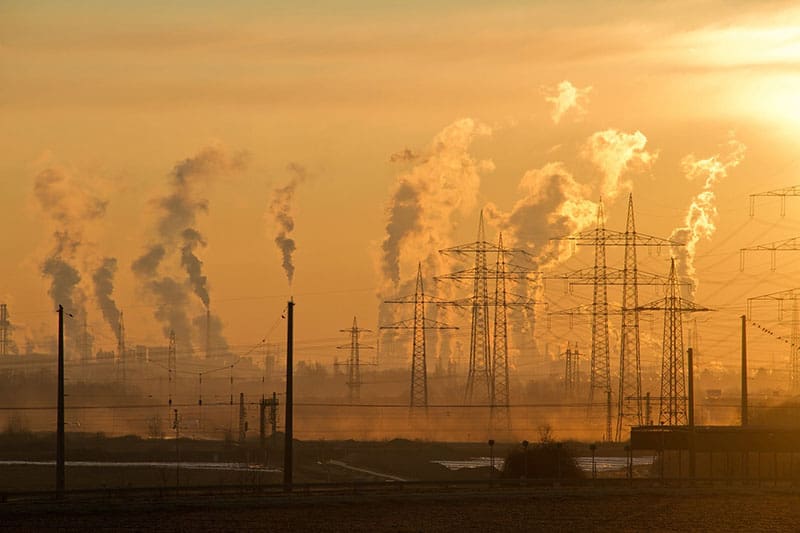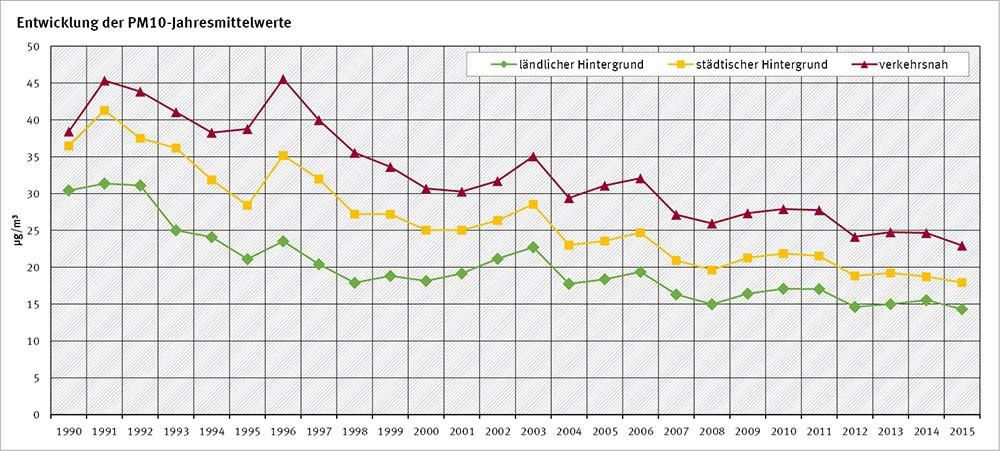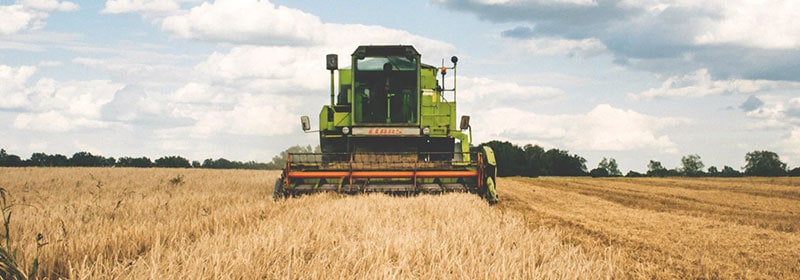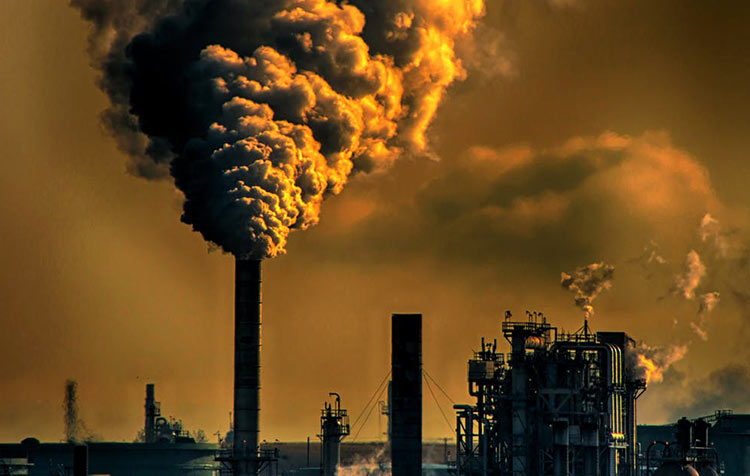The air pollution is one of the largest Environmental problems of our time. Cars, agriculture, airplanes and especially industry pollute the air we breathe. There is no longer any truly clean air anywhere. Even though air pollution is particularly high in large cities, this environmental problem knows no boundaries. Wind and weather drive pollutants even into seemingly clean, rural regions. Air pollution has global consequences. That is why this environmental problem concerns us all.
In this article, in addition to the definition, I would like to show you statistics, causes, consequences and possible solutions in the fight against air pollution.
What is air pollution?

By air pollution is meant, in general terms, the contamination of the air compared to its normal state. A really clean air is normally composed of 78% nitrogen, 21% oxygen, 0.9% argon, and 0.04% carbon dioxide. together. In this state, our ambient air would create ideal conditions for a healthy life.
The following pollutants are basically assigned to air pollution:
- Ozone (O3): The gas is formed in the air when exposed to high-energy radiation and electrical charges. It is a strong oxidant that can have health consequences for people, for example in the form of respiratory diseases.
- Nitrogen oxides (NO + NO2): Nitrogen oxides (Nitric Oxide (NO) and Nitrogen dioxide (NO2)) are mainly involved in particulate matter pollution and summertime ozone formation. They are increasingly produced in the course of agriculture. The gases can negatively affect biological processes not only in humans but also in plants. In plants, for example, leaf growth is reduced, which in turn results in considerable crop losses.
- Carbon monoxide (CO): The toxic gas carbon monoxide or carbon monoxide is produced when fuels containing carbon are burned. It is therefore produced particularly in road traffic through the exhaust emissions of vehicles - and increases the risk of respiratory diseases immensely.
- Sulfur dioxide (SO2): This toxic gas, which irritates the mucous membranes, is formed primarily when coal or heating oil is burned in industry, but also in households. The gas results in so-called "acid rain", which can destroy entire ecosystems and pollute buildings.
- Particulate Matter (PM): Solid and liquid dust particles that become airborne in traffic through exhaust fumes, tire and brake abrasion, and in industry, e.g., through power plants. PM 10 is the term used for fine dust with a maximum diameter of 10 µm. PM 2.5 to 2.5 µm and everything below 0.1 µm is referred to as ultra-fine dust particles. PM levels are measured in µg/m³. (micrograms per cubic meter)
To what extent we humans blow these pollutants into the air, you will now learn in the next paragraph.
Causes of air pollution
We know that we pollute the air we breathe. But to what extent are we doing this? To find out what we can do about the air pollution of our planet, we should also learn more about the causes of this environmental problem.
We contribute to air pollution by doing the following things:
- Industry: The main emissions in industry are sulfur dioxide, carbon dioxide and particulate matter. This occurs, for example, in mining, in the manufacture of consumer goods, or in the pharmaceutical and fertilizer industries.
- Traffic: In road traffic, not only does Microplastics, but a crucial part of the greenhouse gases that are harmful to the climate. Diesel cars emit particularly high levels of nitrogen dioxide - the majority of which is attributable to diesel passenger cars and commercial vehicles.
- Agriculture: In Germany, more than 50% of methane emissions and 95% of ammonia emissions were caused by agriculture in 2016. Livestock farming in particular is a key contributor to agricultural methane emissions.
- Households: The increasing number of household appliances (TVs, laptops, smartphones, refrigerators) and generally one-person households (higher heating costs per m²) is increasingly polluting our air - directly and indirectly. Of course, the increased number also plays a decisive role in the share of households in air pollution.
- Natural causes: Natural events such as a volcanic eruption, forest fires or ordinary pollen count may also have a small share in air pollution. I do not want to forget that, even if the share is vanishingly small.
While the industry mainly uses sulfur oxides and CO2 into the environment, traffic is particularly responsible for the formation of nitrogen oxides and carbon monoxide. Agriculture also plays a decisive role in releasing nitrogen oxides, but also ammonia and methane, into the atmosphere.D
Air pollution statistics

Basically, it can be said that we are on the right track in Germany - because we have been able to significantly reduce the pollution in the air. But that doesn't mean we can rest on our laurels. Above all, it is important to work together with developing countries to combat air pollution. The following statistics provide a little insight into why:
- 520.000 people died prematurely in 2014 as a result of air pollution. In Germany alone, the environmental problem cost 80,000 people many years of their lives.₁
- The limit value for nitrogen dioxide pollution for German cities is 40 µg/m³. Nevertheless Munich (78 µg/m³) and Stuttgart (73 µg/m³) by far the most air-polluted cities in Germany in 2017.
- In Onitsha (Nigeria), the prevailing 594 µg/m³ (PM) by far the highest air pollution levels of any city on earth. In particular, cities from Nigeria, Pakistan, India, Saudi Arabia and China are represented among the top 20 most polluted cities.₂
- In 2016, the causes of nitrogen oxide emissions in Germany were found to be 39,9% the trafficr, to 24.2% of the energy industry, to 10.6% the households, to 10.4% of agriculture, to 7.2% the manufacturing sector and to 7.1% industrial processes assigned.₃
There is a big problem with air pollution worldwide. In the next paragraph, you will find out what the consequences are.
Consequences of air pollution
How we deal with our air is of course not without consequences. Even if air pollution in Germany is generally declining, people and the environment in many developing countries suffer particularly from smog. The environmental problem, which is almost exclusively caused by us humans, ultimately harms our own health and also our environment.
Consequences for our health

Even if air pollution is barely visible, the impact on our Health should not be underestimated. The higher the exposure in your environment, the greater the risks of suffering from the following health complaints.
- Respiratory diseases: Fine dust particles (0.1 to 2.5 μm, PM2.5) penetrate unharmed through the nose, throat and trachea into the bronchi. The result can be reduced lung function, an asthma attack, and even bronchitis.
- Cardiovascular disease: Ultrafine dust particles have a diameter of less than 100 nanometers and are thus 1,000 times smaller than the diameter of a human hair.₄ They cannot be pre-filtered by the nose, throat and trachea and thus penetrate unharmed into our bloodstream in the rain. The consequences can extend as far as a heart attack.
- Higher mortality: It has already been scientifically confirmed that a consequence of air pollution reduces life expectancy.
These effects of unclean air provide good reasons to take action against air pollution and reduce your own pollutant emissions.
Consequences for environment & climate

Unfortunately, air pollution has significant negative consequences for our natural environment. These contribute, for example, quite decisively to the climate change and are the reason why we currently have to do everything in our power to Stop climate change.
These consequences for our environment are attributed to air pollution:
- Agriculture: Especially the emission of nitrogen oxides can negatively affect the leaf growth of plants. In addition, soils are becoming increasingly infertile, which not only has severe consequences for all living creatures that depend on them, but also has a decisive, negative economic effect.
- Ecosystems: Sulfur and nitrogen oxides pose a significant threat to our ecosystems. Air pollution threatens to over-acidify and over-fertilize sensitive habitats. Tree damage is also a common environmental consequence.
- Climate: Particulate matter and soot have a direct impact on the greenhouse effect and climate change. In addition, increasing acid rain is a threat to plant life CO2 binds.
Behind these consequences hangs a long rat's tail of further problems for humans, animals and nature.
Consequences for economy & society

Anyone who now still gets the idea that air pollution is not a serious problem may have an economic interest in keeping the air clean.
These are the consequences of air pollution from an economic point of view:
- Crop failures: Since the growth of plants and also the fertility of the soil is negatively affected by the impure air, crop failures are a logical consequence.
- Building damage: The combustion of coal and fuel oil produces toxic sulfur dioxide, as described. The acid rain that follows has an aggressive effect on buildings and consequently entails high consequential costs.
- Health care costs: There are not only high costs for the state, but also for each and every one of us citizens. Because respiratory and cardiovascular diseases are unfortunately a frequent consequence of air pollution. Accordingly, higher health costs are also the consequence.
- Psychological changes: A study in Seoul₅ (South Korea) found that air pollution makes us more anxious, depressed, immoral as well as more criminal. A survey also found that more than one in two Germans feels stressed by air pollution.₆
This overview should make clear that air pollution is a problem of all people and all sectors. Whether it is a private household or a business corporation. In the end, every living being on this planet suffers from this environmental problem.
What to do about air pollution?

In order to do something about air pollution, it is basically important to divide the environmental problem into geographical, substance-related and problem-related. This is because not every region has the same level of air pollution and not everywhere emits the same sheep substances.
In the following, I would therefore like to create sensible approaches to solving the environmental problem of air pollution, also in relation to this.
Solutions in the private household
Even if not all of us are farmers or work in industry, everyone can do their part in the fight against air pollution in their private lives. The following approaches are recommended in private households for this purpose:
- Use public transport & bicycle
- Avoid unnecessary car trips (see car free living)
- Do not fly by plane
- Green electricity prefer
- Use solar energy
In principle, however, the Zero Waste Lifestyle and the minimalist lifestyle naturally play a major role in the fight against air pollution. After all, the fewer products that have to be produced, the lower the industry's emissions of pollutants.
Politics & economy against air pollution
Even if we can do in everyday life and very much for a clean air, the greatest responsibility lies with the policy. There, the following measures and decisions can contribute to solving the environmental problem:
- Stricter control of limit values
- Subsidize renewable energies more strongly
- Expansion of public transport in cities
- Introduce driving bans & speed limits
Voluntary measures have never really brought about a change. Therefore, to further stop air pollution, clear laws & bans as well as stricter controls & penalties are needed above all.
Tip: At Minimize air pollution I've put together a detailed article with valuable tips on how to fight your personal share of the environmental problem of air pollution.
Together against air pollution
As you can see, air pollution is one of the biggest environmental problems of our time. But each and every one of us can do something about it, educate people and set a good example. Because as varied as the causes of particulate matter and other types of air pollution may be, there are just as many solutions to the problem.
Do you have any questions or your own experiences with polluted air that you'd like to share? Then feel free to leave a comment below this post.
Stay healthy,

PS.: In the Environmental protection blog you will find more information about the environmental problems of our time. Maybe you are also interested in plastic avoidance in everyday life - then I recommend you the article about the plastic free lifestyle.
References:
₁ https://www.aerzteblatt.de/nachrichten/81823/Mehr-als-80-000-Todesfaelle-durch-Luftverschmutzung-in-Deutschland
₂ World Health Organization, WHO.
₃ https://de.statista.com/infografik/15705/stickoxid-emissionen-in-deutschland
₄ https://www.umwelt.sachsen.de/umwelt/luft/3600.htm
₅ https://www.ncbi.nlm.nih.gov/pmc/articles/PMC3404652
₆ https://www.wiwo.de/politik/deutschland/landlust-statt-landflucht-die-kleinstadt-wird-wieder-geliebt/22918660.html






This is exactly what I was looking for on the subject of fine dust filters. I will discuss it with my brother, who also knows a lot about this subject. Let's see if he can give me more tips!
Comments are closed.